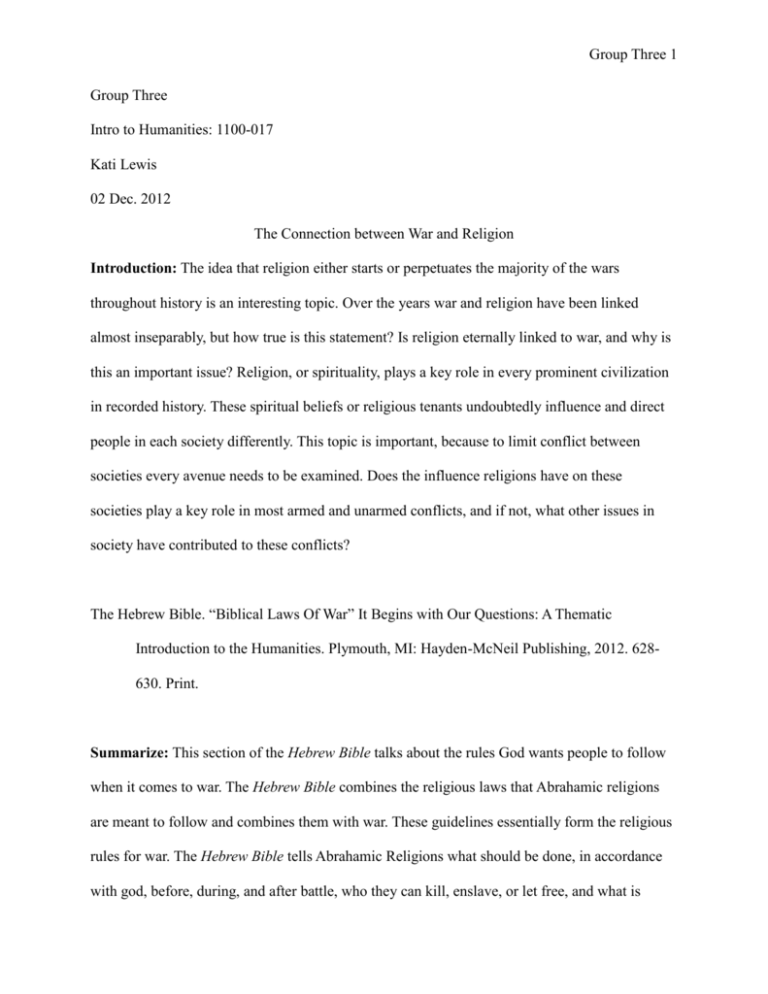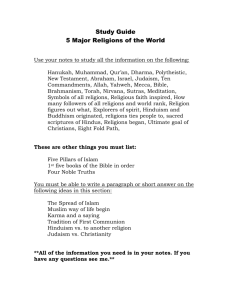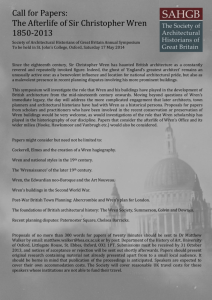here
advertisement

Group Three 1 Group Three Intro to Humanities: 1100-017 Kati Lewis 02 Dec. 2012 The Connection between War and Religion Introduction: The idea that religion either starts or perpetuates the majority of the wars throughout history is an interesting topic. Over the years war and religion have been linked almost inseparably, but how true is this statement? Is religion eternally linked to war, and why is this an important issue? Religion, or spirituality, plays a key role in every prominent civilization in recorded history. These spiritual beliefs or religious tenants undoubtedly influence and direct people in each society differently. This topic is important, because to limit conflict between societies every avenue needs to be examined. Does the influence religions have on these societies play a key role in most armed and unarmed conflicts, and if not, what other issues in society have contributed to these conflicts? The Hebrew Bible. “Biblical Laws Of War” It Begins with Our Questions: A Thematic Introduction to the Humanities. Plymouth, MI: Hayden-McNeil Publishing, 2012. 628630. Print. Summarize: This section of the Hebrew Bible talks about the rules God wants people to follow when it comes to war. The Hebrew Bible combines the religious laws that Abrahamic religions are meant to follow and combines them with war. These guidelines essentially form the religious rules for war. The Hebrew Bible tells Abrahamic Religions what should be done, in accordance with god, before, during, and after battle, who they can kill, enslave, or let free, and what is Group Three 2 allowed to be taken as spoils of war. Rhetorical Analysis: Since this section is straight from the Bible, one can determine that God's prophets wrote the words. It has been around for millenniums and has survived the test of time. The Bible is definitely meant for various audiences who want to learn about Abrahamic religions and for those who currently follow its teachings. Assess: This source is fundamental because it combines both aspects of spirituality and war into one reading that discusses what the followers of the Bible are required to do in times of war. It ties all other sources together because of its broad range of topics. It is the combination of war and religion and how they are connected. Tures, John. “Myth of the Modern Religious War.” psmag.com. 11/29/2012 Web. 09/10/2011. Summary: John Tures Writer of, Myth of the Modern Religious War, and his research team, take historical data from Kalevi J. Holsti's 1991 book Peace and War: Armed Conflicts and International Order, 1648-1989, and the New Correlates of War dataset on conflicts since 1990, to test the assertion that religion is a primary cause for war. From their analysis, they determine that conflicts are caused by the following: Religion, Real Estate (territorial disputes), Riches (battles over resources) , or Regimes (one country attempts to replace another country's government with one it prefers). In their analysis they determine that out of the potential causes for conflict, religion is the least likely. Rhetorical Analysis: John A. Tures is a professor at LaGrange College in Georgia. Complete Group Three 3 source information is included in the article so it may be reviewed. The sources cited are highly respected in academic circles. Assessment: Because of the authors credibility, and the credibility and authority of the sources the author uses, I believe that he creates a compelling argument supporting the premise that war is not a primary driving cause for war. Wrenn, Eddie. “The Good and Bad of Religion: How Faith is a Potent Force for BOTH Cooperation and Conflict”. dailymail.co.uk. 12/03/2012 Web. 05/18/2012. Summary: Eddie Wren author of the article, “The Good and Bad of Religion: How Faith is a Potent Force for Both Co-operation and Conflict”, shows the reader in his article that religion can be a source of good and bad in world history. Wren believes, “Across history and cultures, religion increases trust within groups but also may increase conflict with other groups, according to research.” Wren uses anthropologist, Scott Atran, to show that religion has been used over the last few millennia to promote cooperation without the negative effects of war. Atran has used cross-cultural surveys to show religious circles allows people to become more cooperative, but secular social contracts and these same circles can lead to support for suicide attacks. Atran also found that in areas of flagrant religious war, such as Palestine and Israel, efforts to broker peace that include material offerings often insight further bloodshed and anger. Wren goes on to explain that Iranians were more offended when economic aid or relaxed sanctions were offered in a deal instead of not. In fact, in Gaza in 2005 Palestinian refugees refused a deal that allowed them a Palestinian State with aid but were in favor of the same deal without aid. Wren also points out that religion separates groups that believe in different religions but brings those who believe in Group Three 4 the same religion together. Wren believes this is a “paradox” that cannot be avoided. Wren uses Atran to show possible solutions to religious conflicts, stating that sometimes gifts or, “symbolic gestures”, can even sway military leadership into negotiations. Atran believes that, “In-depth ethnography, combined with cognitive and behavioral experiments among diverse societies (including those lacking a world religion), can help identify and isolate the moral imperatives for decisions on war or peace.” Rhetorical Analysis: Wren is an insignificant writer in this peace and all his information stems from Atran. Atran has a PhD from Colombia university in anthropology, and has been interviewing terrorists and studying human relations since the 1970’s even teaching at Cambridge University, one of the leading educational universities in all of Europe. Atran’s data is formed from studying conflict in the Middle East, and is regarded around the world as essential to peaceful progress in religious conflict zones. Assessment: This source allows the reader to understand why religion though confusing is a paradox when it comes to war. Not only does religion promote peace, but it also is deeply rooted in some areas of the world to war. Conclusion: While commonly believed that religion is a driving factor behind war, these articles prove that it’s not that simple. We believe that although religion is essential in binding groups of people together and influences civilizations ideology, it is important to clear up the misconception that religion is the main cause for wars, although it is often used as a scapegoat. We believe that religion or spirituality is eternally linked to the ideology of society, but religion itself is not responsible for most wars because there are so many other social and political factors Group Three 5 that contribute to most conflicts.







